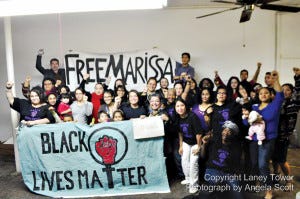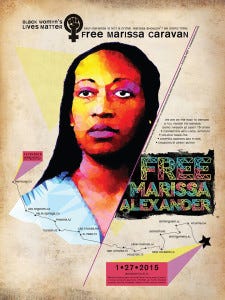Quest is to overturn Alexander verdict in ‘Stand Your Ground’
 As the 2014 fall semester came to a close, many students had plans to relax, travel, party, protest and work some extra hours. I, along with five other women, had plans to caravan through the South to help free Marissa Alexander after standing her ground.Many people know about the “Stand Your Ground” law in Florida because of Trayvon Martin’s killer, George Zimmerman, but not many know how it pertains to Alexander.In 2012, Alexander, a black woman and mother of three, fired a warning shot to ward off her abusive husband, Rico Gray, harming no one. She was arrested. It took the jury all of 12 minutes to convict and sentence Alexander to 20 years in prison. Florida Atty. Gen. Angela Corey was the prosecutor in Alexander’s case, as well as that of Zimmerman. Corey failed to get prison time for Zimmerman but got a conviction for Alexander.Alexander then filed and won the appeal overturning her conviction. But Corey re-charged and re-arrested her, leaving Alexander facing 60 years if she lost this next trial. Corey offered Alexandra a deal if she pleaded guilty to the now three counts of 20 years for each charge, endangering her batterer’s life as well as the lives of his two children. Keep in mind the gun was shot once into the ceiling where the bullet remained until retrieved by police. Now Alexander was faced with a choice. Either take a plea for 65 more days in prison or possibly get 60 years. She pleaded out. So after house arrest, followed by more charges while awaiting a hearing then being put back in jail, it was decided that on Jan. 27, Alexander would have a hearing to determine whether she would spend five more years in jail or get two years of house arrest.So, it was within this context that a fistful of courageous and determined women formed the organization “Black Women’s Lives Matter Free Marissa Caravan.”Women and men from different organizations and backgrounds poured resources into our effort. Throughout the ride to Jacksonville, folks not only gave us financial help but opened up their homes, created original prints, t-shirts and comic books for us to sell for gas and food while on this caravan for freedom. So, off we went.
As the 2014 fall semester came to a close, many students had plans to relax, travel, party, protest and work some extra hours. I, along with five other women, had plans to caravan through the South to help free Marissa Alexander after standing her ground.Many people know about the “Stand Your Ground” law in Florida because of Trayvon Martin’s killer, George Zimmerman, but not many know how it pertains to Alexander.In 2012, Alexander, a black woman and mother of three, fired a warning shot to ward off her abusive husband, Rico Gray, harming no one. She was arrested. It took the jury all of 12 minutes to convict and sentence Alexander to 20 years in prison. Florida Atty. Gen. Angela Corey was the prosecutor in Alexander’s case, as well as that of Zimmerman. Corey failed to get prison time for Zimmerman but got a conviction for Alexander.Alexander then filed and won the appeal overturning her conviction. But Corey re-charged and re-arrested her, leaving Alexander facing 60 years if she lost this next trial. Corey offered Alexandra a deal if she pleaded guilty to the now three counts of 20 years for each charge, endangering her batterer’s life as well as the lives of his two children. Keep in mind the gun was shot once into the ceiling where the bullet remained until retrieved by police. Now Alexander was faced with a choice. Either take a plea for 65 more days in prison or possibly get 60 years. She pleaded out. So after house arrest, followed by more charges while awaiting a hearing then being put back in jail, it was decided that on Jan. 27, Alexander would have a hearing to determine whether she would spend five more years in jail or get two years of house arrest.So, it was within this context that a fistful of courageous and determined women formed the organization “Black Women’s Lives Matter Free Marissa Caravan.”Women and men from different organizations and backgrounds poured resources into our effort. Throughout the ride to Jacksonville, folks not only gave us financial help but opened up their homes, created original prints, t-shirts and comic books for us to sell for gas and food while on this caravan for freedom. So, off we went.
Once we left the Bay Area we stopped in Los Angeles and met up with activists occupying LAPD facilities. After holding a teach-in, we participated in discussions on what was going on in Haiti, the Black Lives Matter movement and media relations.
The folks there, like us, had a vision. Not only to seek justice for Alexander and women like her, but to draw attention to a bigger problem of mass incarceration and the physical and systemic violence towards women that is normalized in today’s society.
So with this in mind we hit the road and stopped in Palm Springs. We picked a main street, threw up our banners and sang “Free Marissa” songs in the tune of Christmas carols well into the night. We also gave out flyers to anyone who would take them and talked to those who would listen.
Next stop was a teach-in followed by a protest at the Phoenix police department. One of the most memorable experiences, though, would come a day later when we had a chance to hold another teach-in at the Black Lives Matter National Conference in Tucson. We will be forever in the debt of those women who gave money, heart, soul, and leant us their ears.
Every stop we made would not only restore my faith in people, but redefine my opinions of strong women and their place at the forefront of this movement — as well as the Black Lives Matter movementand others like it.
 We didn’t always have events planned in every city. In locations without a schedule, we sought out any busy street and took out our flyers, banners, and our trusty bullhorn. This is what we did in Las Cruces, New Mexico.
We didn’t always have events planned in every city. In locations without a schedule, we sought out any busy street and took out our flyers, banners, and our trusty bullhorn. This is what we did in Las Cruces, New Mexico.
For the largest stretch of the trip (Texas) we would stop in El Paso first, which was one of the most amazing places I had the pleasure of visiting. We met with women from the community who embraced us and even welcomed us with dancing, other native ceremonies as well as lots of local and national press.
I had never talked to so many cameras in my life, but if there was ever a reason and a time, it was this and now.
Next was San Antonio, which is rumored to have the most African American murders by police nationwide. After our teach-in at a radical bookstore, we picked up our heels and bullhorn to march with hundreds of thousands of people in the largest MLK march in the nation.
In the days and states leading up to Alexander’s court hearing, the caravan would stop in New Orleans; Jackson, Miss.; Alabaster and then Montgomery, Ala; Atlanta, Ga; and then on to the Jacksonville, Fla courthouse steps on the morning of Jan. 27. In all we did teach-ins, die-ins, marches, banner and flyering, sang carols and original songs, protested, spoke at local radio stations, gave press conferences, worked with local activists around Alexander’s case as well as floated the hashtag #PardonHer around the country to beg Florida governor Rick Scott andPresident Obama for her release.
The outcome of her hearing was bittersweet. On the one hand, she won out with the lesser of the two charges, two years of house arrest. She still has a felony on her record for merely defending herself. The state of Florida should be ashamed of itself for that, especially Atty. Gen. Corey.
Early on in our caravan, one of the women gave me a statistic we often used in our teach-ins. On average, women who kill the men battering them face 20 years in prison but men who kill the women they batter face an average of only seven.
This is very disturbing. It is especially upsetting in the case of Marissa Alexander, who had a legally licensed gun, had taken classes on how to handle it, chose not to kill but to warn, but was nonetheless sentenced as if she had.
I know we were all riding down to Jacksonville hoping for a pardon for but knowing the bigger fight was ahead of her. My decision to go may not have had a big effect on her freedom but it had a profound effect on my life.
This experience taught me (and I’m sure Marissa), that people do care. And given the opportunity, people will show you what they are made of and if you’re lucky,